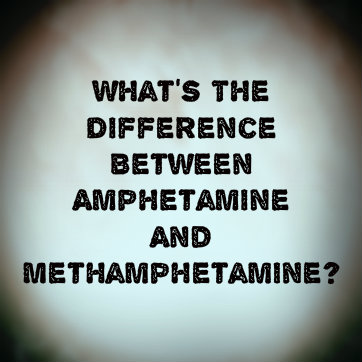The similarity in names suggests that there is a fundamental similarity between amphetamine and methamphetamine. How are they different? How are they the same? While the drugs have the same chemical base, the process they undergo drastically alters the effect they have on the body. The methamphetamine vs. amphetamine question may be used to try to determine which is more harmful or which is more addictive. While the drugs bear similarities, their differences are significant. Read on to understand more about each.
Amphetamines
 Amphetamine has a variety of medical uses and drugs containing amphetamines have been prescribed by physicians for a variety of conditions. For example, because amphetamines are powerful psychostimulants and increase metabolism, they have often been incorporated into prescription weight loss aids. Amphetamines also have the ability to increase focus and heighten mental clarity and thus have been prescribed to treat those struggling with attention-deficit hyperactivity disorder (ADHD) or to help soldiers stay awake during long stints in the field.
Amphetamine has a variety of medical uses and drugs containing amphetamines have been prescribed by physicians for a variety of conditions. For example, because amphetamines are powerful psychostimulants and increase metabolism, they have often been incorporated into prescription weight loss aids. Amphetamines also have the ability to increase focus and heighten mental clarity and thus have been prescribed to treat those struggling with attention-deficit hyperactivity disorder (ADHD) or to help soldiers stay awake during long stints in the field.
Methamphetamines
Methamphetamine is more commonly associated with illegal, recreational use and is never prescribed medically. Methamphetamine is amphetamine double methylated (amphetamine is methylated once). The science behind this may be complicated for the layperson, but the important thing to understand is that methamphetamine, because it has been methylated twice, is significantly faster acting, more potent, and more addictive, and thus quite a bit more dangerous.
The result of both is euphoria because of increased release of norepinephrine and dopamine in the brain. This release of pleasure chemicals stimulates the brain’s reward center, enticing the user to not only continue use, but, as tolerance develops, to crave ever increasing levels of the drug.
The effects of use are similar in both amphetamines and methamphetamines including increased pulse, hyperactivity, dizziness, and insomnia, but the effects are more potent with methamphetamines. When taken exactly as prescribed and under the careful monitoring of a physician, amphetamine usage can be safe. The same cannot be said of methamphetamines, for which experimentation can carry grave results.
Abuse Of Amphetamine And Methamphetamine
Though amphetamines may boast a variety of medical uses, the prescription drugs containing amphetamines still carry risk as well as unfavorable side effects. These drugs are highly addictive and carry significant potential for abuse.
While they have unique and distinct effects on the body, in both cases the body develops tolerance rapidly and more and more of the drug is required to achieve the desired results. Even if an individual does desire to stop taking the amphetamine-based prescription or to stop using meth, the physical dependence can throw the individual into severe withdrawal.
It is recommended that those intending to cease use of amphetamines or methamphetamines do so under the care and supervision of a doctor or with the assistance of a drug rehab program and related therapy.
So amphetamine vs. methamphetamine isn’t really the issue. Both drugs are potent and dangerous with the potential for abuse and addiction. While amphetamine may be used safely under the supervision of a physician, it still carries risk and should be taken with caution and care.
If You Or Someone You Know Is Struggling With An Addiction
Call Us Now – We Are Available 24/7
Substituted amphetamines are a group of chemically related substances that possess a strong chemical resemblance to the manmade stimulant drug amphetamine. Some of these substances-including ephedrine, pseudoephedrine, and cathinone-come from plant sources and predate synthetic amphetamine by thousands of years or more. Others-including methamphetamine and MDMA (Ecstasy)-are synthetic and have only existed for anywhere from decades up to slightly more than a century. Almost all substituted amphetamines produce pleasure and stimulant effects in the central nervous system; to varying degrees, they may also produce hallucinations and increased feelings of connectedness toward others. Side effects common to most of these substances include potentially deadly toxic reactions (overdoses) and long-term risks for drug addiction.


